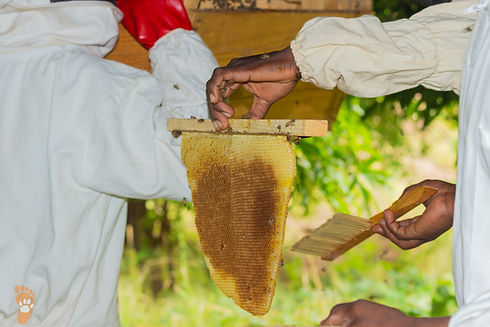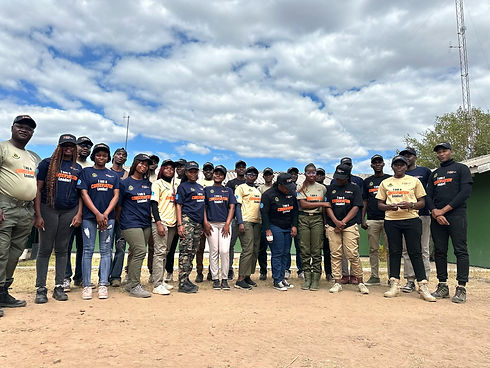People & Wildlife Thriving Together!




OUR STRATEGIC PLAN
2024 - 2028
Our Strategic Plan outlines the roadmap for achieving our conservation goals over the next five years. With a clear focus on protecting wildlife, empowering communities, and promoting climate smart practices, this plan highlights our commitment to addressing current challenges and securing a future where humans and wildlife coexist harmoniously.

How community-led conservation can save wildlife | Moreangels Mbizah
A life changing solution to
Human-wildlife conflict
About Us

Founded in 2019, Wildlife Conservation Action (WCA) promotes human-wildlife coexistence in Zimbabwe's critical wildlife areas. Integrating indigenous knowledge and scientific expertise, we partner closely with communities to craft effective solutions for human-wildlife conflict, benefitting both livelihoods and wildlife, especially key species such as lions and elephants. We address pressing threats faced by these wildlife species due to habitat loss, climate change and conflict with humans.
Using a non-lethal, culturally sensitive approach, we conduct research to understand wildlife behaviour and trends, which guides our interventions. In addition to reducing human-wildlife conflict and improving community livelihoods, the non-lethal and climate smart mitigation measures such as the use of mobile bomas, chilli farming, bee keeping and holistic land and livestock management also contribute to climate change mitigation and adaptation by promoting sustainable agriculture practices, carbon sequestration, and enhancing ecosystem services.
We also raise awareness among the community and advising farmers on fortifying livestock enclosures, monitoring wildlife movements to protect livestock and crop fields, and collaborating with broader conservation and community associations for greater impact.
We educate and raise awareness of wildlife and environmental conservation to Zimbabwe’s younger generations, fostering love and understanding of their natural heritage.
What We Do
Human-Wildlife Conflict Mitigation
Our human-wildlife co-existence projects are focused on reducing costs and increasing benefits. We are working with local communities in reducing and preventing incidence of conflict and increasing the benefits communities get from living alongside wildlife and improving community livelihoods.
Landscape Restoration and Livelihoods
The focus is to empower local communities with the knowledge and resources needed to develop sustainable and eco-friendly livelihoods. By fostering a sense of sufficiency, we aim to alleviate poverty, reduce pressure on natural resources and contribute to overall community well-being.

Where We Work




Our Projects
Nyaminyami District
Human-Wildlife Conflict Mitigation Project
In human dominated landscapes co-existence between humans and wildlife can only be achieved when loss of human life and livelihoods (crops and livestock) to wildlife is reduced. The project’s vision is to restore wildlife populations that benefit communities living in the Sebungwe landscape of north western Zimbabwe.


Mbire District Human-Wildlife
Conflict Mitigation Project
The project's objective is to improve HWC mitigation and monitoring in Mbire District hotspot areas. It is specifically addressing human-carnivore mitigation through provision of predator proof cattle bomas and reinforcement of existing conventional livestock kraals.
Guardians Of The Wild (GOTW)
Guardians of the Wild (GOTW) is our conservation education program, which is aimed at educating children in rural and urban schools about the importance of conservation and sustainable development. This is achieved through the establishment of conservation clubs in the schools, all under the name GUARDIANS OF THE WILD.


Binga District Human-Wildlife
Conflict Mitigation Project
The project aims to enhance efforts to manage and track Human-Wildlife Conflict in Binga District’s high-risk zones. It seeks to support communities with sustainable measures that lessen clashes with wildlife and build resilience, while encouraging harmony between local people and their environment.
Landscape Restoration and Livelihoods Project
The focus is on equipping local communities with the knowledge and resources to build sustainable and environmentally friendly livelihoods. Through activities such as apiculture, chilli farming, and holistic land and livestock management, the project promotes the regeneration of degraded landscapes while creating alternative income streams. In doing so, it helps to ease poverty, lessen pressure on natural resources, and improve overall community well-being.

Conservation Leadership Project
Our conservation leadership initiatives aim to empower the next generation of conservation leaders at universities through both technical and personal development. By collaborating with ten local state universities and various private entities, we enhance the academic curriculum with practical experiences and foster the development of soft skills, ultimately boosting the job readiness of all conservation students.

Our commitment to the SDGs












We address 12 of 17 Sustainable Development Goals

2024
Annual Report
The year 2024 was marked by significant progress in our conservation efforts, community empowerment initiatives, and educational outreach. From strengthening local capacities to mitigate human-wildlife conflict to expanding our environmental awareness programs, each milestone reflects our commitment to protecting both people and nature. This year also brought new partnerships, inspiring stories from the field, and measurable impact that continues to drive our mission forward.


Our work at a glance

7 562 households adopting resilience building strategies against human-wildlife conflict and climate change

98% decline in
human-wildlife conflict incidents in the initial wards (Nyaminyami, Ward 3 & 4)

17 089 livestock protected
with a value of $2.3 Million
277.5 Acres plots
under regenerative agriculture

26 616 people reached on positive environmental stewardship

16 conservation leaders
trained




